Greetings! Gallbladder surgeons are the key players who can significantly improve your quality of life. In this engaging and insightful blog post, we’ll walk you through the intricacies of gallbladder surgery, discuss the different types of procedures, and guide you on what to look for when choosing a top-notch gallbladder specialist.
Ready to take this journey towards better health? Let’s dive in!
Key Takeaways
- Gallbladder surgery is a procedure used to treat disorders related to the gallbladder, such as gallstones or cancer.
- It is important to employ a skilled and certified surgeon for successful outcomes and minimal risks.
- Southlake General Surgery in Texas offers board-certified general surgeon services with personalized care tailored to each patient’s needs.
Understanding Gallbladder Surgery
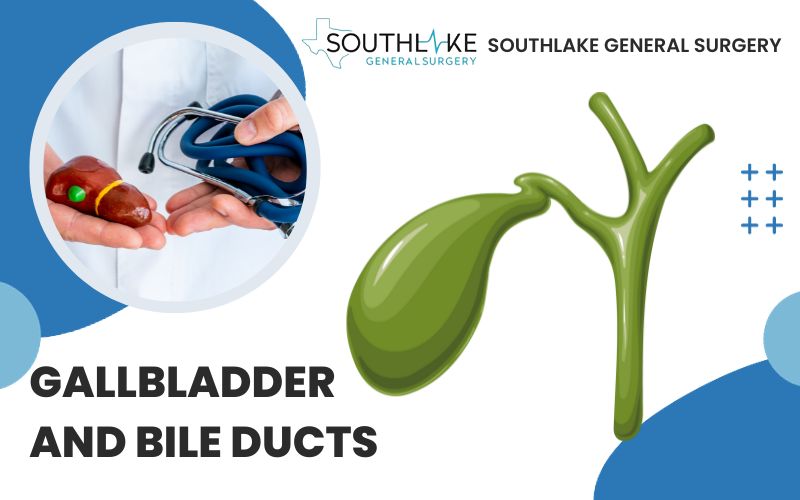
The gallbladder is a small yet important organ. It plays a vital role in the digestive system of humans, particularly in relation to the gallbladder and bile ducts.
It stores bile, a fluid produced by the liver that aids in breaking down fats during the digestion process. When the gallbladder or its bile ducts, including the common bile duct, become blocked or inflamed, it can lead to gallbladder disease, which requires treatment, often involving surgery.
Gallbladder surgery, also known as cholecystectomy, addresses disorders like:
- gallstones
- inflammation
- infection
- cancer
These disorders are often identified when doctors diagnose gallbladder disease.
A skilled surgeon specializing in gastrointestinal surgery or a general surgeon with the right training is key to a successful procedure and risk minimization in the digestive tract, particularly when dealing with issues in the upper right abdomen.
Gallbladder Function

The primary function of the gallbladder is to store bile, and the gallbladder releases bile into the small intestine when needed, particularly during the digestion of fatty foods.
Bile facilitates the breakdown of fats and the absorption of fat-soluble vitamins and nutrients. It also plays a role in eliminating waste products, such as bilirubin from the breakdown of red blood cells.

When the gallbladder is not functioning properly, difficulties in digesting fats may arise, leading to unpleasant symptoms such as abdominal tenderness gallbladder issues, which can manifest as uncomfortable symptoms such as:
- bloating
- diarrhea
- abdominal pain
- clay-colored stool
- abdominal tenderness and pain
Eating fatty foods can exacerbate these issues. To diagnose gallbladder problems, it is essential to consult a healthcare professional who can perform the necessary tests and examinations.
Reasons for Gallbladder Removal
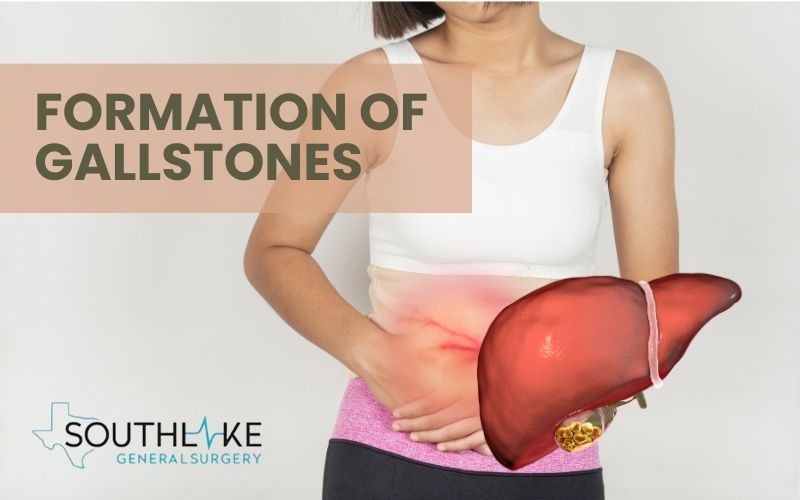
Gallstones, the most common cause of gallbladder inflammation (cholecystitis), are solidified bile that accumulates around a source. Indications of gallstones include:
- Pain in the abdomen
- Distention
- Nausea
- Vomiting
- Icterus
Gallbladder removal may be required due to various reasons, such as:
- Gallstones
- Inflammation
- Infection
- Gallbladder Cancer
These are all conditions that may necessitate gallbladder disease treatment. Gallbladder stones can pose significant risks, such as leading to pancreatitis or obstructing bile duct flow, resulting in jaundice.
In some cases, bile duct cancer may develop as a consequence of gallbladder stones. It is crucial to diagnose bile duct cancer early for effective treatment.
Importance of Skilled Surgeon
Choosing a skilled and qualified surgeon for gallbladder surgery is critical. Such gallbladder surgeons can offer:
- Top-notch care
- A successful operation
- Reduced complications
- Thorough removal of the gallbladder or gallstones
- The best patient outcomes
A laparoscopic surgeon performing gallbladder removal surgery must hold certain specialized certificates, demonstrating their expertise in this procedure. This knowledge and skill are vital for safe and effective execution, especially in cases of gallbladder inflammation.
Types of Gallbladder Surgery
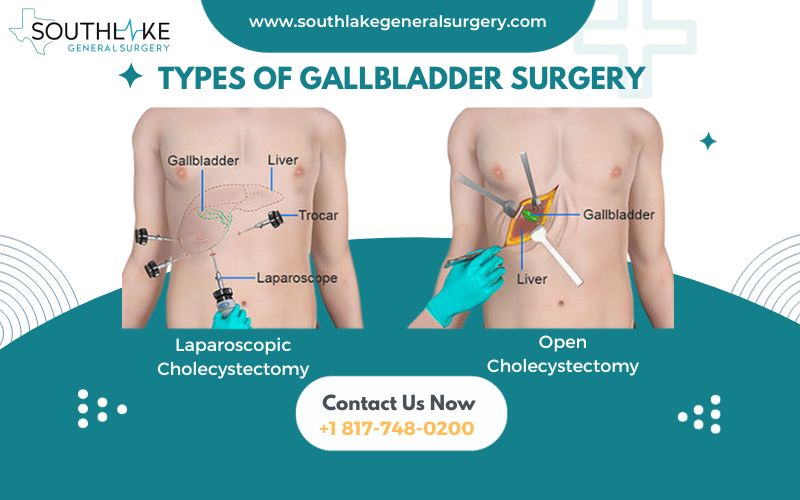
There are two primary types of gallbladder surgery performed by gallbladder surgeons: open cholecystectomy and laparoscopic cholecystectomy. Both involve the removal of the gallbladder and may require working around the bile duct. The choice of procedure depends on the patient’s specific condition and the surgeon’s expertise.
Open cholecystectomy is a traditional surgical procedure in which the gallbladder is removed through a large incision in the upper right of the abdomen. On the other hand, laparoscopic cholecystectomy is a minimally invasive procedure that entails making several small incisions in the upper right of the abdomen and utilizing a laparoscope to remove the gallbladder.
Open Cholecystectomy
Open cholecystectomy is a conventional surgical procedure that entails a larger incision in the upper right abdomen to extract the gallbladder. It is typically employed in cases where there are complications or contraindications for laparoscopic surgery, such as cirrhosis, gallbladder cancer, or extensive adhesions in the abdomen.
The potential risks associated with open cholecystectomy include infection, bleeding, and injury to the bile ducts, digestive tract, or other organs. Furthermore, the larger incision may result in a longer recovery period and increased pain. However, it remains a viable option when laparoscopic surgery is not feasible or poses greater risks.
Laparoscopic Cholecystectomy
A Laparoscopic cholecystectomy is a minimally invasive surgical procedure that utilizes small incisions and a camera to remove the gallbladder. A laparoscope, a thin tube with a camera attached, is inserted through one of the incisions to provide a clear view of the surgical area. Specialized instruments are then used to remove the gallbladder through the other incisions.
The laparoscopic surgery offers several advantages over the open method, including a quicker recovery, less pain, and a decreased risk of infection. Due to these benefits, laparoscopic cholecystectomy has become the preferred method for most gallbladder removals, especially when aiming to treat gallbladder disease effectively.
Finding the Right Gallbladder Surgeons
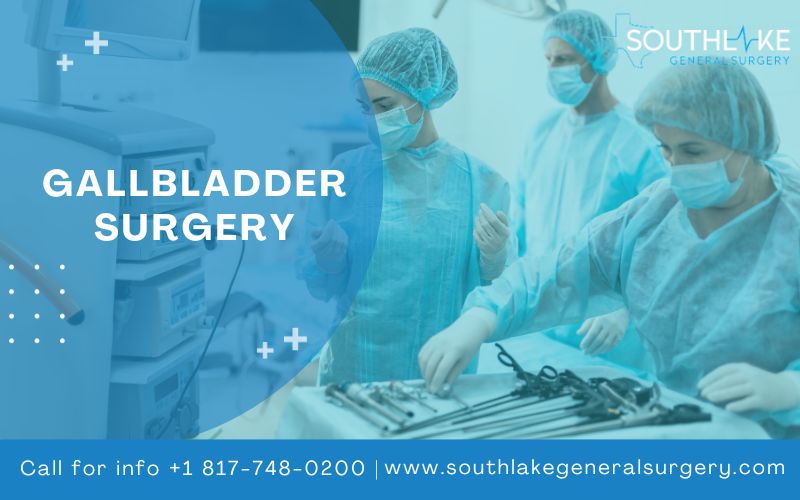
It’s critical to find the right surgeons’ for your gallbladder surgery. Considerations should include:
- Board certification
- Experience
- Skills
- Patient reviews
A competent surgeon can promise a successful procedure with minimized risks and optimal patient outcomes.
Verifying a surgeon’s credentials before entrusting them with your care is a must. A board-certified surgeon assures that they’ve met specific standards and qualifications and are equipped with the necessary expertise to deliver top-tier care.
Board Certification

Board certification is a process by which doctors demonstrate their expertise in a specific medical specialty by passing a specialty-specific exam. This exam evaluates medical knowledge, clinical knowledge, and diagnostic skills.
Board certification is considered the highest level of accreditation within a given specialty, representing a notable credential of proficiency. By choosing a board-certified surgeon, you can have confidence in their skills and qualifications.
Board certification assures that the surgeon has satisfied certain standards and possesses the required expertise to provide top-quality care.
Experience and Skills

A surgeon’s experience and skills are vital for successful gallbladder surgery. An adept surgeon boasts a track record of successful operations and is well-versed in the subtleties of gallbladder removal.
They can perform the procedure safely and effectively, minimizing complications and ensuring optimal patient results.
When evaluating gallbladder surgeons, it is essential to consider the following:
- Their experience and qualifications in gallbladder removal
- Their success rates
- The duration of their tenure in the medical field
- Any specialized medical training they may have completed
Patient Reviews
Patient reviews can offer invaluable insight into the caliber of care supplied by a specific surgeon or healthcare facility. By assessing the reviews of past patients who have undergone the same treatment, you can gain a better understanding of the surgeon’s performance and patient satisfaction, allowing you to make a well-informed decision.
Southlake General Surgery: Your Trusted Gallbladder Specialist

For those seeking expert care in gallbladder surgery, Southlake General Surgery in Southlake, Texas, is an excellent choice. Dr. Valeria Simone MD, a board-certified general surgeon, leads a team of highly skilled professionals who specialize in gallbladder surgery. They provide personalized and compassionate care for their patients.
Expertise and Experience
Dr. Valeria Simone MD is a board-certified general surgeon with a wealth of experience in gallbladder surgery. She is dedicated to providing the highest standard of care and ensuring the best possible outcome for her patients.
Southlake General Surgery’s team of highly experienced surgeons offers a comprehensive range of surgical services, including advanced laparoscopic surgery and treatment for various conditions, such as hernias, appendicitis, cancer, and more.
Personalized Care
Southlake General Surgery provides personalized care and treatment options for gallbladder patients. Their services include:
- Comprehensive evaluation and diagnosis
- Minimally invasive laparoscopic gallbladder removal
- Advanced surgical techniques
- Post-operative care and support
Their team of dedicated professionals understands the unique needs of each patient and works closely with them to develop a tailored treatment plan that ensures the best possible outcome.
From preoperative testing to postoperative care, Southlake General Surgery is committed to providing the support and guidance necessary for a smooth and successful recovery.
Their approach to patient care reflects their commitment to delivering high-quality, compassionate healthcare that prioritizes the well-being and satisfaction of their patients.
Preparing for Gallbladder Surgery
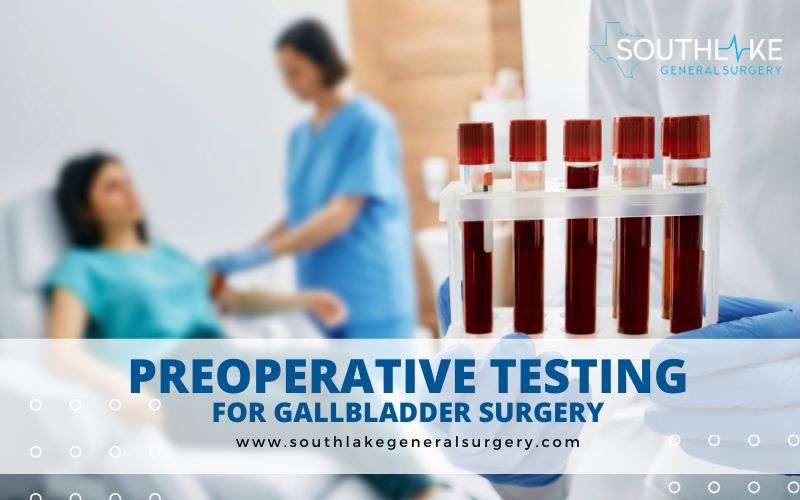
Preparation for gallbladder surgery necessitates preoperative testing and comprehension of the postoperative care process. This strategy ensures optimal conditions for surgery and a speedy recovery with minimal complications.
Before surgery, it is generally recommended to take a bath or shower without applying any lotions, perfumes, deodorants, or nail polish.
Additionally, it is essential to follow instructions related to fasting from food and fluids. Your healthcare team may provide further instructions and guidance to ensure a successful procedure.
Preoperative Testing
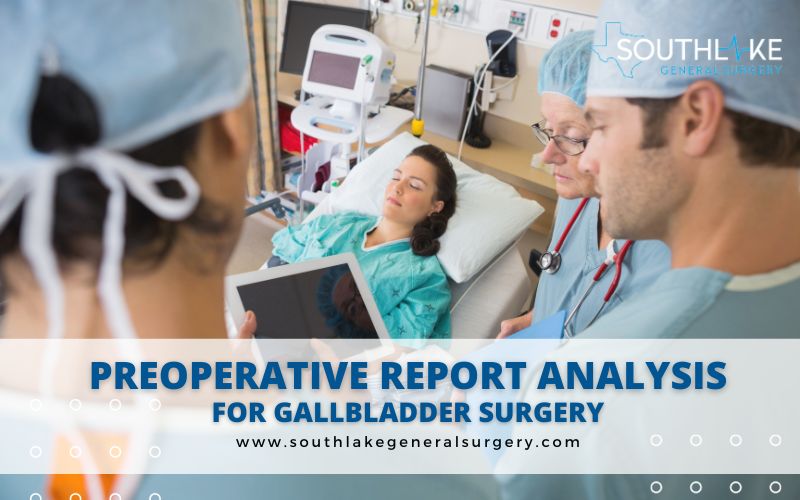
Preoperative testing is key in determining a patient’s fitness for surgery and identifying any potential complications. This process includes:
- A comprehensive assessment of the patient’s physiological state
- A review of their medical history
- An evaluation of their overall wellbeing
- An examination of their current medications
Tests may include blood tests, imaging studies, and other diagnostic procedures, depending on your specific situation and the type of surgery being performed.
Your surgeon will discuss these tests with you and provide guidance on the necessary preparations.
Postoperative Care

Postoperative care is key to a successful recovery following gallbladder surgery. This encompasses pain management, wound care, and follow-up appointments to track your progress. Adequate postoperative care helps reduce the risk of complications and guarantees a smooth recovery.
Pain management may involve medications, physiotherapy, and other therapeutic modalities. Wound care includes cleaning the surgical site, changing dressings, and monitoring for signs of infection.
Follow-up appointments with your surgeon or healthcare provider will track your recovery process and address any concerns or complications that may arise.
Summary
In conclusion, understanding the importance of gallbladder surgery and finding the right gallbladder surgeon are crucial steps towards a successful procedure and recovery. If you’re based in Southlake, Texas, you’re in luck because Southlake General Surgery is a trusted provider of expert and personalized care for gallbladder surgery patients.
By considering factors such as board certification, experience, skills, and patient reviews, you can make a well-informed decision in choosing the best surgeon for your needs. With their skilled team of professionals, you can be confident in your journey towards better health.
Appointment
For more information on “Gallbladder Surgeons: Types of Surgery and Risks” or to book an appointment with Dr Valeria Simone MD, at Southlake General Surgery, Texas, USA. Please contact our healthcare expert today at +1(817)748-0200. You can also make an online appointment with us.
Frequently Asked Questions
Which doctor is best for gallbladder surgery?
Based on the given information, it is evident that a gastrointestinal or general surgeon is the best option for gallbladder surgery. They have the necessary skills, and this type of procedure is one of their most frequent operations.
Gastrointestinal surgeons are highly trained and experienced in performing gallbladder surgery. They understand the anatomy of the gallbladder and the surrounding organs, and they are able to identify and address any gallbladder problems.
What kind of surgeon operates on the gallbladder?
A general surgeon or a gastrointestinal surgeon with the necessary training typically performs a cholecystectomy, which is the surgical removal of a patient’s gallbladder. This is one of the most commonly performed surgeries by gastrointestinal surgeons.
What is the most common gallbladder surgery?
The most common gallbladder surgery is laparoscopic cholecystectomy, which uses a tiny video camera and special surgical tools inserted through four small incisions to remove the organ. It is minimally invasive and very safe, allowing for a quicker recovery time and smaller scars than with an open procedure.
Is gallbladder surgery considered major surgery?
Gallbladder removal surgery, known as cholecystectomy, is considered a major surgery due to its risks and complications, and is usually not rushed into. Despite being laparoscopic and minimally invasive, it still involves several incisions and carries some risks.
How does a gastroenterologist check your gallbladder?
A gastroenterologist typically checks the gallbladder using ultrasound, CT scans, and endoscopic procedures such as ERCP. This endoscopic procedure involves placing a tube down the patient’s throat into the stomach and then into the small intestine to inject dye, allowing the ducts of the gallbladder, liver, and pancreas to be seen on X-ray.
Medically Reviewed By: Dr. Valeria Simone MD
Board-certified General Surgeon at Southlake General Surgery, Texas, USA.
Follow us on Facebook and YouTube.
References
- National Library of Medicine. How does the gallbladder work? https://www.ncbi.nlm.nih.gov/books/NBK279386/
- National Library of Medicine. Open Cholecystectomy https://www.ncbi.nlm.nih.gov/books/NBK448176/
- National Library of Medicine. Laparoscopic Cholecystectomy https://www.ncbi.nlm.nih.gov/books/NBK448176/
- SAGES. GALLBLADDER REMOVAL SURGERY (CHOLECYSTECTOMY) PATIENT INFORMATION FROM SAGES. https://www.sages.org/publications/patient-information/patient-information-for-laparoscopic-gallbladder-removal-cholecystectomy-from-sages/

